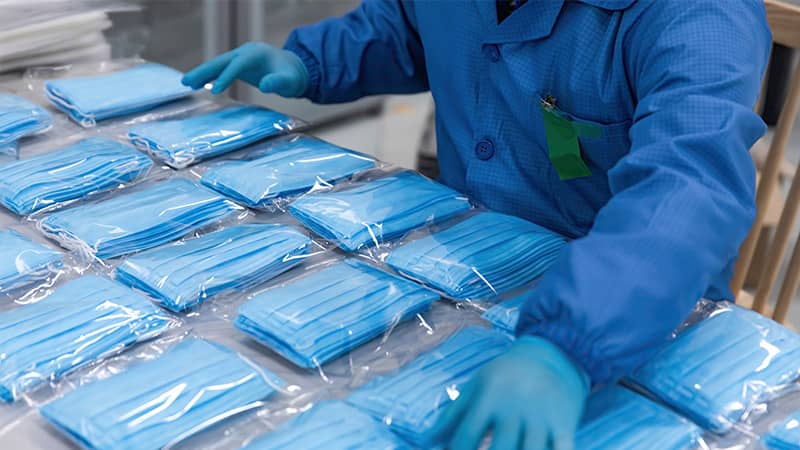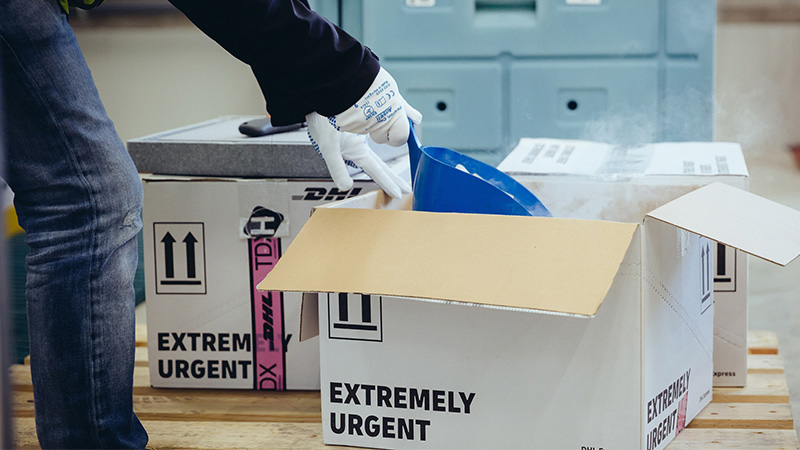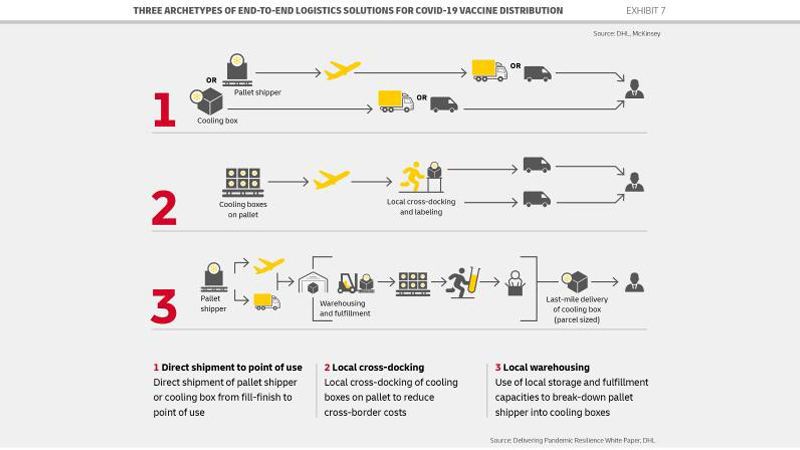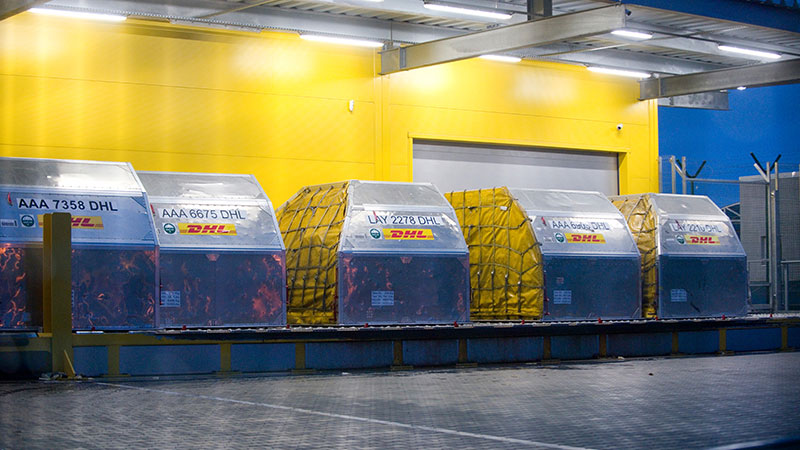Grow your business with the Discover newsletter
Logistics advice & insights straight to your inbox
Subscribe now
As the world went into lockdown thanks to the The Covid-19 pandemic, DHL felt the impact across its entire global network almost immediately. In the early days and weeks of the pandemic, the initial logistics challenges came from countries shutting their borders, grounding flights and tightening import rules, which hindered the movement of air freight.
Demand for medical supplies and PPE to the frontline caused extra logistical pressures. From the onset, Asia was in the cockpit of the supply race, with millions of PPE and test kits shipped out of China and South Korea, causing surges in distribution requirements. The pandemic was shining a light on how indispensable international logistics networks are for ensuring that societies can manage in a global crisis.
DHL Express also saw a sharp increase in B2C shipments through its network as locked-down consumers around the world turned to online shopping. Yet, many e-commerce companies with online orders to deliver, who relied on complex supply chains to do so, found out just how fragile they could be. Companies that had suppliers based in China, for example, were left stuck when the country grounded flights.

DHL is certainly no stranger to managing crises. Since 2005, its Disaster Response Teams – DHL volunteers working in partnership with the United Nations Office for the Coordination of Humanitarian Affairs – have responded to natural disasters around the world. When a hurricane or flood hits, the specially trained teams utilize their logistics skills to support airports within the disaster zones so that the movement of relief supplies is not hampered.
But this pandemic is on an entirely different scale.
From the onset, it was clear that the only route out of the problem would be with a vaccine. In late 2020, the world received the news it had been waiting for when several of the global vaccine candidates that had been in clinical trials received approval from regulatory authorities for public use. Three of the vaccine manufacturers at the forefront – Pfizer, Moderna, and AstraZeneca –predicted a manufacturing capacity of 5.3 billion doses in 2021, which could be used to vaccinate about 3 billion people. Such numbers indicate the unprecedented size of the logistics challenge in worldwide vaccine delivery that will lie in the months ahead.

The IATA1 (International Air Transport Association) has noted that, if everyone in the world received a single dose, the medicines would fill 8,000 Boeing 747 cargo aircraft2. DHL estimates that approximately 200,000 pallet shipments and 15 million deliveries in cooling boxes, as well as 15,000 flights, will be required across the various supply chain set-ups to get the job done.
One of the biggest challenges for the distribution of the vaccines is the strict temperature conditions in which some of them must be stored – as low as –80°C. This poses specific logistics problems to existing medical supply chains that conventionally distribute vaccines at ~2–8°C, and to regions with limited cold chain infrastructure.
Transportation and cold chain logistics under stringent temperature requirements may require extraordinary measures to reach people outside the 25 countries with the most advanced logistics systems, which are home to just one-third of the world population.

Fortunately, DHL has plenty of experience with vaccine storage. DHL Medical Express works with the pharmaceutical and healthcare sector to transport temperature-controlled supplies to hospitals, laboratories, and research institutions safely and in one piece. For these shipments, time is of the essence; they are often needed in real life and death situations with no margin for delay.
Poor logistics infrastructure will provide challenges to the vaccine rollout too, particularly in developing nations. In these instances, public-private partnerships will be critical to relieve pain points experienced by governments. By partnering with a logistics provider throughout the entire supply chain, governments can benefit from integrated logistics planning, consistent quality services, and a simplified stakeholder landscape. In a global health emergency, an effective logistics partner will bring in vital crisis experience, local knowledge and access, and process excellence. Government-to-government partnerships will also be important since health emergencies disregard national borders.
To cope with such unprecedented targets, logistics providers must establish medical supply chains rapidly to deliver vaccines worldwide. “As a global logistics player, highly experienced and specialized in getting mission-critical supplies to the right places when they are needed most, we are looking to shape this conversation,” said Frank Appel, DPDHL’s CEO.
Last year, to kick-start the dialogue and improve pandemic resilience in medical supply logistics, DHL partnered with analytics firm McKinsey & Company3 to find answers to some of the big supply chain questions for countries facing large-scale public health emergencies. Together they produced a White Paper which provides a framework for the cooperation of logistics companies with authorities, NGOs, and the life sciences industry to establish measures to ensure the most stable and safe supply chains possible. Besides an emergency response plan, this includes a partnership network, strong physical logistics infrastructure and IT-enabled supply chain transparency. The paper outlines how a response unit with a clear mandate should be put in place to implement all critical activities at short notice.
"After numerous months of preparation we are happy that our mission of vaccine distribution has now started and we can contribute our logistics expertise and capabilities to make vaccines accessible worldwide" - Travis Cobb, Head of Global Network Operations and Aviation at DHL Express

In December 2020, DHL became part of making the pandemic history by joining the international COVID-19 distribution. Flights operated by DHL Express and DHL Global Forwarding touched down in Tel Aviv with the first batch of vaccines for Israeli citizens on board. Since then, the rollout has expanded quickly. With its hub and gateway network across the globe, DHL was able to quickly pivot to help the vaccine distribution, delivering first batches for citizens in countries including Mexico, Italy, Greece, Oman, Austria, Chile, Sweden. Bahrain, Costa Rica, and Singapore.
Despite the daunting and relentless operation that lies ahead, Travis Cobb says DHL’s international presence means it is prepared. “Our teams across 220 countries and territories and our global network as the backbone of cross-border Express logistics is ready – to deliver anytime and anywhere."
Whilst the global rollout of the COVID-19 vaccine has turned the dialogue around the pandemic towards “recovery” and life returning to “normal”, it will leave a legacy of change. The need for better infrastructure and more resilient and fully flexible supply chains has been highlighted and will require investment to cope with future global crises.
“The question is not if but when the next large-scale health crisis will come around. By acting now – with informed planning, teamwork and effective partnerships – we can put ourselves in a better position than ever before”, Frank Appel concludes.
1 - IATA
2 - Pharmaceutical Technology, November 2020
3 - McKinsey & Company